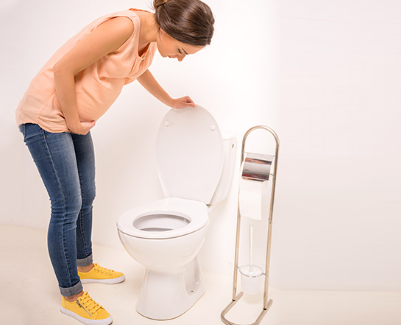Having a small amount of white mucus in stool shouldn’t be a cause of concern. It shouldn’t actually bother you at all. What does it mean to have mucus in stool? This post will explore the possible causes and how to treat white mucus in your stool.
Read also:

A stool of a healthy person normally contains a small amount of mucus. This is a jellylike substance that is found on the lining of the intestines to keep it lubricated and moist. You should consult your doctor if you have an increased amount of mucus in stool. Report to the doctor if the stool is thick and accompanied by bleeding or probably a change in bowel habits.
An increased amount of mucus in stool associated with diarrhea can be a sign of intestinal infections. If the stool has blood, with other signs such as abdominal pain it could mean a serious underlying condition such as Crohn’s disease, ulcerative colitis or even cancer.
What is mucus in stool?
Mucus is the smooth, thick jellylike substances produced in many places throughout the human body. The linings of the intestines have a thin layer of mucus to lubricate the surfaces and allow materials to move without distraction.
Having some amount of mucus in the stool is normal. But an increase in the amount of mucus if accompanied by diarrhea, pain or blood is a cause of concern. It is an indication of a more serious underlying problem such as infection or inflammation.
Increased mucus could mean you have an inflammation in the bowel including ulcerative colitis and Crohn’s disease. In addition, bloody stool can be sign of cancer of the colon.
What does it mean?
Mucus plays a vital role in the digestives tract. It helps to lubricate the lining of the colon and keep it moist. This helps to moves material from the body smoothly. In most cases, your mucus should be clear and thin. But illness, diet or environmental factor may sometimes increase mucus consistency and color.
Stool is considered to be normal when the mucus is yellow or clear. But when stool has white mucus, it can be a sign of bacterial infections, anal fissures, a bowel obstruction or Crohn’s disease.
White mucus in stool can be associated with other signs such as:
- Increased amounts of mucus
- Pus or blood in the stool
- Stomach pain, bloating or cramping
- Sudden change in bowel habits, color or consistency
If you have an increase amounts of mucus associated with color chan ge, it can be a sign of illness such as inflammations or infections. Blood in mucus is an indication of damage of the lining of the intestines.
Why is there mucus in my stool? – Possible causes
White mucus in stool can result from an inflammatory gastrointestinal condition that may require medical treatment. These among others could be the reason why there is mucus in your stool. The possible causes include:
1. Bacterial infections
This is a common cause of increased mucus in stool. Bacteria such as campylobacteria, salmonella, shigella and Yersinia are some of the bacteria responsible for white mucus in stool. These bacteria cause poisoning and other infections. The symptoms of bacterial infections include: diarrhea, cramping, vomiting, nausea and fever.
While some cases of infections are minor and therefore can be treated at home, serious cases require medication from a doctor.
2. Anal Fissures and Ulcers
Anal fissure can be defined as a tear in the lining of the lower rectum. It happens when your persistence diarrhea, tough stool and problems with bowel movements. The tear can cause painful bowel movements but they are not as serious as such. Treatment can be found over- the- counter. It can help reduce the pain and clear up the tear within a couple of days.
Ulcers appear similar to anal fissures. The condition may require hospitalization.
3. Bowel Obstruction
If you have symptoms such as cramping, constipation, bloating, it could mean you have an obstructed bowel. It could be caused by an impacted stool, tumor, hernia or passing of non-food item. Bowel obstruction could cause increased amounts mucus in stool that changes color to white.
If these symptoms persist such that they cause a change in bowel habits, report to your doctor. Treatment may be necessary.
4. Diet
Diet plays a crucial role in your general health. If you have allergies to food such as nuts, lactose or gluten it can cause white mucus in stool. Such foods can cause discomfort in the digestive tract. The foods have symptoms such as bloating, diarrhea, rashes and constipation. Your doctor will determine whether you have food allergy or intolerance. Make it an effort to contact your doctor if you notice increase in mucus or blood after eating certain types of food.
5. Crohn’s disease
This is an inflammatory bowel disease that affects your gastrointestinal tract. Initial symptoms include diarrhea or fatigue. You may also notice a change in color of stool. This condition can often spread into the layers of bowel tissue. It can also be painful and debilitating. It can be cause life-threatening complications.
See your doctor if you have persistent changes in bowel movements. Other symptoms to warrant a visit to your doctor include abdominal pain, blood in your stool, weight loss, diarrhea and fever.
6. Irritable Bowel Syndrome, Ulcerative Colitis
Increased white mucus in stool could be a sign of Irritable bowel syndrome, IBS. People with diarrhea are prone to suffer from IBS than those with constipation. The symptoms include abdominal pain, cramping, and diarrhea. IBS doesn’t cause inflammation but white mucus in stool could be as a result of IBS.
You may have heard of ulcerative colitis. This is a form of inflammatory bowel disease, IBD, which can results in the mucous membraned of the colon to become inflamed and developing ulcers. As a results the result, these ulcers may bleed and may also produce pus and mucus. You will notice white mucus in stool.
7. Rectal or Colon Cancer
White mucus in stool associated with blood can be a sign of a serious underlying health condition like rectal or colon cancer. Rectal or colon cancer starts in your rectum or colon. The symptoms include blood in your stool, colon bleeding and unexplained weight loss.
If you have any of these symptoms, report to your doctor for diagnosis. Early diagnosis is the key to effective treatment
Treatment for mucus in stool
There is no one particular treatment for white mucus in stool. To cure the excess or abnormal mucus, your doctor will have to diagnose and treat the underlying cause which may be related to the inflammation in your rectum or colon.
As in all medical cases, most doctors will begin with a physical exam and a blood test. The test result helps the doctor to understand your physical health. More tests may be done just to get additional information to narrow down on the root cause or problem. Such tests include blood test, stool culture, colonoscopy, endoscopy, and urinalysis.
Upon diagnosis, your doctor will prescribe treatment based on the test results and his professional judgment.
Bacteria found in the stool will in most cased be treated with antibiotics. Your eating habits may need to change to lessen the symptoms. This is recommended to people with food allergy issue. Lifestyle changes may include:
- Increase fluid intake
- Eat foods rich in probiotics or supplements that have probiotics
- Eat anti-inflammatory foods such as low-acid and non- spicy foods
- Increase your fiber, fat and carbohydrate intake.
People suffering from serious or chronic conditions such as Crohn’s disease, irritable bowel syndrome, ulcerative colitis and cystic fibrosis may require prescription medication and an ongoing treatment.
Surgery can be done to treat and relieve conditions such as anal fissures and fistulas. Medications and a combination of lifestyle changes may also be needed.
If cancer is discovered early, you may be referred to a specialist or oncologist who may treat your cancer. This may reduce and lessen the symptoms you may be suffering from.
Sources and references:
- https://www.medicalnewstoday.com/articles/310101.php
- https://www.healthline.com/health/mucus-in-stool – treatment
- https://www.healthgrades.com/symptoms/mucus-in-stool
- https://www.mayoclinic.org/mucus-in-stool/expert-answers/faq-20058262


